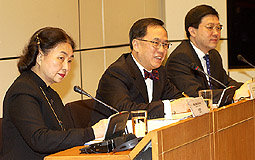 |
| Report round-up: Chief Secretary for Administration Donald Tsang, flanked by Constitutional Development Task Force members Secretary for Justice Elsie Leung and Secretary for Constitutional Affairs Stephen Lam, presents the conclusions of the first report concerning issues of legislative process. |


|
If there is a need, changes in the method for selecting the Chief Executive in 2007 may be considered, the Constitutional Development Task Force has concluded in its first report.
However, any proposed changes to the methods for selecting the Chief Executive and the Legislative Council must have a broad consensus, Chief Secretary for Administration Donald Tsang said today.
Introducing the report, he said any such changes would need the endorsement of two-thirds of the Legislative Council members and the Chief Executive's consent. Then, they would be forwarded to the Standing Committee of the National People's Congress, for approval or for the record, Mr Tsang said.
Following a meeting in Shenzhen this morning with Standing Committee representatives - including its Deputy Secretary General Qiao Xiaoyang, its legislative Affairs Commission Vice Chairman Li Fei, and the Hong Kong & Macau Affairs Office Deputy Director Xu Ze - Mr Tsang met the media to describe the outcome and outline the task force's views on the issues of legislative process relating to constitutional development.
Task force received more than 600 submissions
He noted that since it was set up on January 7, the task force had met with about 82 organisations and individuals and received more than 600 letters, faxes and emails from the public. These were analysed in an objective and professional manner, focusing more on the quality of the arguments rather than the number of views received.
Five main conclusions are outlined in the report.
* Regarding the legislative process to be used for amending methods for selecting the Chief Executive and for forming the Legislative Council as set out in Annex I and Annex II to the Basic Law, the task force believes changes must be made at two levels. First, the "methods" should be amended in accordance with the provisions as set out in the relevant Annexes to the Basic Law. Then, local electoral laws should be amended to prescribe the detailed arrangements.
No need to invoke Article 159
* As long as the relevant amendments are not inconsistent with the provisions in the main text of the Basic Law, the amendment procedures in Article 159 need not be invoked.
* If it is decided that there is a need to amend the "methods", the procedures in the relevant Annexes should be followed. Under Article 74 of the Basic Law, only the Hong Kong Government should introduce bills related to the political structure to the Legislative Council.
* If a consensus on how to form the fourth-term Legislative Council cannot be reached, the method for forming the third-term Legislative Council should be used.
Changes to CE selection method may be considered for 2007
* On how the phrase "subsequent to the year 2007" should be understood, the report reiterates the task force's view: If there is a need, amendments to the method for selecting the third term Chief Executive in 2007 may be considered.
Mr Tsang said the Standing Committee representatives had listened attentively to the task force's views in their morning meeting.They attached great importance to receiving the report before it gave its interpretation of Basic Law provisions and felt the views expressed would help committee understand the views of the Hong Kong community.
The representatives said the Standing Committee would interpret, according to law, the legislative provisions in the Basic Law. The objective was to enable all parties concerned to clearly grasp the basis of the legislative process, on which Hong Kong's constitutional development would be explored.
Committee's interpretation authoritative, legally binding
Mr Tsang stressed that the committee's interpretation of these issues will offer a timely solution to our practical problems, noting that the next stage of work on constitutional development cannot begin without first resolving the issues of legislative process.
"It is most authoritative and legally binding for the Standing Committee to give its interpretation of the issues of legislative process in accordance with the power authorised by the Basic Law," he said, adding that it also complies with the law and the Constitution.
"I hope everyone will understand that the issues of legislative process relating to constitutional development should not be subject to personal interpretations by individual officials or legal professionals of both places. Otherwise, organisations and individuals may continue to hold on to different opinions, and may even resort to litigation."
The committee would still be called on for its interpretation in that event, "and the community would have to face uncertainties regarding constitutional development, thus affecting the pace of constitutional development."
Second report to focus on issues of principles
Issues of principles relating to Hong Kong's constitutional reform will be the focus of the task force's second report, Mr Tsang said.
He thanked the community for expressing their views on the issues of legislative process. The submissions, summaries of views relating to the legislative process issues and copies of the first report are available at the 18 District Offices. They can also be seen on the Constitutional Development website.
Go To Top
|



